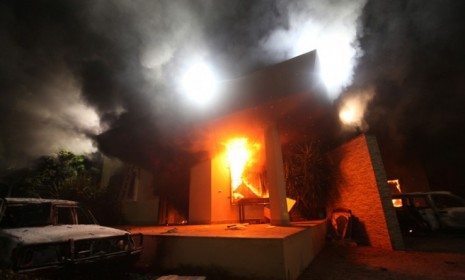What really happened in Benghazi? A guide
What was first reported as a Libyan protest turned violent may have been a carefully staged attack on the U.S. Consulate — on the anniversary of 9/11

A free daily email with the biggest news stories of the day – and the best features from TheWeek.com
You are now subscribed
Your newsletter sign-up was successful
The first accounts of the attack on the U.S. Consulate in Benghazi, Libya, which killed Ambassador Christopher Stevens and three other Americans, blamed the violence on a mob enraged over an anti-Islam video posted online. But just about every early detail reported about the assault turned out to be wrong, and now the Obama administration is looking into whether this was a planned attack by Islamist militants, not simply a riot that spun out of control. What do we know so far about what really happened in Benghazi? Here, a brief guide:
Was there, or wasn't there, a protest?
There was. As happened in Egypt on Tuesday — and in Yemen and Tunisia on Thursday — civilians gathered outside the U.S. Consulate in Benghazi to vent their rage over a viral YouTube video, ostensibly the trailer for an American-made movie insulting Islam's Prophet Mohammad. Eventually, though, a group of heavily armed militants "infiltrated the march," according to Libyan Deputy Interior Minister Wanis al-Sharif, and used it as cover to launch an attack on the Consulate compound.
The Week
Escape your echo chamber. Get the facts behind the news, plus analysis from multiple perspectives.

Sign up for The Week's Free Newsletters
From our morning news briefing to a weekly Good News Newsletter, get the best of The Week delivered directly to your inbox.
From our morning news briefing to a weekly Good News Newsletter, get the best of The Week delivered directly to your inbox.
Didn't the U.S. have security?
Yes, but it didn't have a contingent of Marines like the ones assigned to protect embassies. An undisclosed number of State Department security officers were stationed inside the compound, and a detail of private Libyan guards patrolled outside its walls. Together, they weren't enough to repel the assault.
How long did the attack last?
The battle went on for four hours. It started around 4 p.m. Washington time (10 p.m. local time), when attackers fired small arms at the Consulate, with Stevens, information officer Sean Smith, and another American seeking safety inside. Then the attackers unleashed more powerful weapons, blasting a hole in the building's exterior with a rocket-propelled grenade and hurling homemade bombs. Thick, black smoke from the fire quickly filled the building, with Stevens and the other two officials still inside.
A free daily email with the biggest news stories of the day – and the best features from TheWeek.com
Did anyone get out?
At least one — reportedly a security officer — did, then returned about 45 minutes later with reinforcements to rescue anyone still there. By then, Smith had choked to death on smoke. Stevens was nowhere to be found. The battle raged for another three hours, with nobody knowing what had happened to Stevens. Finally, a sympathetic local militia helped the security detail regain control of the main Consulate building and get the staff of 25 to 30 people to an annex. That building soon came under fire, and that's where the remaining two Americans, one a former Navy SEAL and member of Stevens' security detail — Glen Doherty, 42 — were killed. It wasn't until the next morning that Stevens' death was confirmed — Libyans had managed to get him to a nearby hospital, but he died from smoke inhalation.
Why does the administration think the attack was planned?
For one thing, it took place on the 11th anniversary of the Sept. 11 terrorist attacks, and al Qaeda sympathizers have long wanted to stage an attack to mark the day. Also, it was a "military-style attack" with all the hallmarks of a "planned, targeted event," says Rep. Mike Rogers (R-Mich), chairman of the House intelligence committee. "You can't have this many coincidences on the same day." Al Qaeda is an obvious suspect, as "the weapons were somewhat sophisticated," says Sen. Dianne Feinstein (D-Calif.), who heads the Senate intelligence panel.
Does this mean Libyans don't want the U.S. in Benghazi?
Actually, the U.S., which helped rebels overthrow Moammar Gadhafi, is well-liked in eastern Libya, says Juan Cole at Informed Comment. It has a 60 percent favorability rating, compared to 28 percent for the hardline Muslims who are the prime suspects in the attack. And many Libyans especially "lionize" Stevens, who was liaison to the transitional national council during the revolution. Still, Cole says, "why in the world he was in an insecure minor consulate in a provincial city on Sept. 11," far from his Marine guards, "is a mystery to me."
Sources: Bloomberg, CBS News, CNN, Informed Comment, Wired
-
 Is Andrew’s arrest the end for the monarchy?
Is Andrew’s arrest the end for the monarchy?Today's Big Question The King has distanced the Royal Family from his disgraced brother but a ‘fit of revolutionary disgust’ could still wipe them out
-
 Quiz of The Week: 14 – 20 February
Quiz of The Week: 14 – 20 FebruaryQuiz Have you been paying attention to The Week’s news?
-
 The Week Unwrapped: Do the Freemasons have too much sway in the police force?
The Week Unwrapped: Do the Freemasons have too much sway in the police force?Podcast Plus, what does the growing popularity of prediction markets mean for the future? And why are UK film and TV workers struggling?